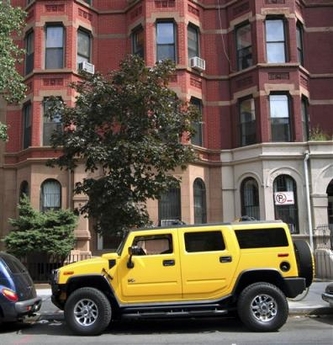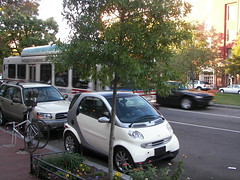The times they are a changing (probably) and we are in the beginnings (maybe) of paradigm shift

Brooklyn. AP photo.
I don't always like the op-eds in the Examiner, but yesterday's paper has a piece by Irwin Stelzer pointing out that economic cues work better than political ones in terms of driving/oil use. His point was that politics-government intervention = bad and economics = good, but the point is still correct: much higher prices for gasoline = signals and impacts that end up changing people's behavior. Changes in people's behavior ends up sending signals to businesses, and collectively these changes in consumer behavior have impact on production of goods and the delivery of services, businesses respond too. See "Economics trumps politics, except in U.S."
This puts "Why a smaller GM is a huge deal," subtitled "Bigger is no longer better for the nation's automakers. As higher gas prices cause consumers to shun SUVs and trucks, Detroit is having to shift gears -- fast," from US News and World Report in perspective. From the article:
GM's announcement today that it will close four SUV and pickup-truck plants -- and possibly stop building Hummers -- is a startling turnaround for Detroit's biggest automaker.
Car companies routinely speed up or slow down assembly lines to tweak the mix of big and small vehicles consumers seem to be most interested in. But shutting down several production lines, and possibly killing off an iconic brand, signal a long-term retrenchment.
(Also see the AP story, "GM plant towns struggle with losses.")
In the short run, this is less likely to have impact within the center cities, because people drive less, and the impact of gasoline prices is still reduced. But there are way too many SUVs and other large vehicles taking up space on the city's streets.
Speaking of economic cues for driving/parking in the city:
Speaking of parking and curbside management, change the residential parking permit system in DC to one that emphasizes the privilege, rather than the right, to park. 40% of the people in DC do not own cars. Why should the 60% that do be privileged with practically free parking spaces?
a. Residential parking permits should cost a lot more generally. As you probably know, Prof. Shoup estimates that the value of the public space on the street is about $1800 annually.
b. There should be a limit on how many residential parking permits can be issued per household. Only one car can fit in front of a typical rowhouse. Multiple cars per household should be discouraged.
c. The rate for residential parking permits should go up considerably for each additional permit per household address.
d. Parking permit rates should be weighted according to how large a car is, and its carbon footprint (maybe).
One of the big problems I'd say anecdotally is that people in the city may only be buying one car, but it is much much larger than it used to be (an SUV). This further reduces available parking inventory for residents.

Labels: car culture and automobility, parking, transportation planning



0 Comments:
Post a Comment
<< Home